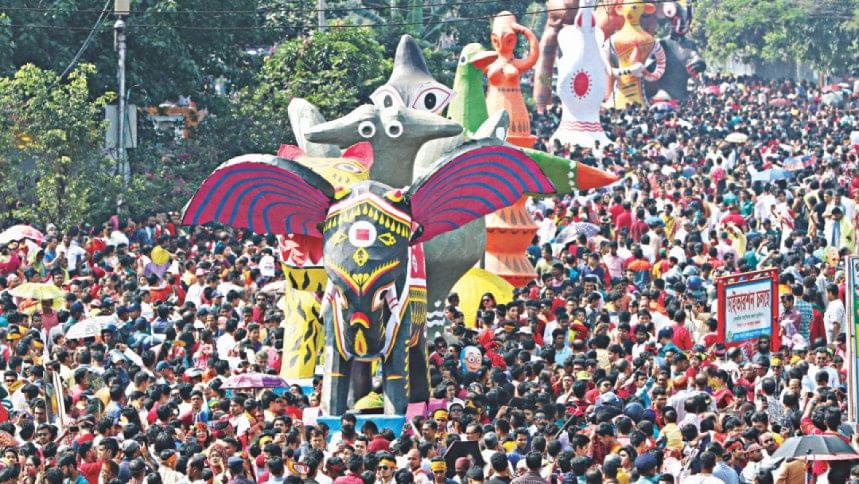‘Mangal Shobhajatra’ renamed to ‘Anondo Shobhajatra’

The procession marking the Bangla New Year, organised by Dhaka University's Faculty of Fine Arts, has been renamed.
Formerly known as "Mangal Shobhajatra", the procession will now be called "Borsho Boron Anondo Shobhajatra".
The decision was conveyed at a press conference yesterday at the fine arts faculty at DU.
DU Vice Chancellor Prof Niaz Ahmed Khan said, "The main theme of the Anondo Shobhajatra conveys two messages -- the end of an authoritarian political system and the spontaneous protest of the people against a distorted system."
Prof Azharul Islam Chanchal, convener of the Nababarsa 1432 Celebration Committee, said, "We have not changed the name; rather, we have restored the original name of the celebration, 'Anondo Shobhajatra'."
He argued that during the first rally in 1989, the name "Anondo Shobhajatra" was adopted spontaneously. However, when it was later renamed Mangal Shobhajatra, that change did not occur in the same "organic manner".
He said the decision was not made under any external pressure.
"The word Mangal was used by fascist regimes in a way that left negative connotations in society. That's why we want to return to the original spirit, a time of spontaneous participation by all people, free from political aggression disguised as cultural practice," he said.
Mentionable, UNESCO recognised the Mangal Shobhajatra as a World Cultural Heritage on November 30, 2016.
Prof AAM Kaoser Hassan, member secretary of the Nababarsa 1432 Celebration Committee, said this year's procession would feature seven large motifs: a face symbolising fascism, a wooden tiger, a hilsa fish, a dove, a palanquin, a water bottle as a symbolic representation of Mugdho -- the young student killed during the July uprising last year -- and a watermelon slice, in solidarity with the people of Palestine.
In Palestine, the watermelon is a symbol of diligence and resistance.
He also said this year, 410 artists from 26 indigenous communities will participate in the celebrations. Among them are communities such as the Mro, Marma, Lusai, Bom, Khiyang, Chakma, Tripura, Tanchangya, Pankhwa, Rajoar, Santal, Mahali, Kol, Malpaharia, Hajong, and others.
DU Proctor Prof Saifuddin Ahmed said law enforcement will not be positioned at the front of the procession this year, although they will be present on both sides to ensure overall security.
Saifuddin said at the time of the rally, only Palashi and Nilkhet road will be kept open for people, while the road from Banglamotor, Matshya Bhaban to the Shahabagh intersection will remain closed.
For security and crowd control, the Shahbag and TSC metro stations will also remain closed from morning until afternoon. The stations will reopen after the procession ends.
After 5:00pm, no one will be allowed to enter the campus, as entry gates will not remain open. However, exit gates will remain open after 5:00pm.
BACKLASH OVER NAME CHANGE
The decision to rename the procession has stirred criticism from various quarters, with some left-leaning student organisations and public intellectuals rejecting the new name.
Prof Anu Muhammad, a former teacher at Jahangirnagar University, said that the decision lacked transparency and public consensus.
"This change did not occur spontaneously or for a well-reasoned cause. It appears to be the result of pressure from groups that have long opposed such cultural expressions," he told The Daily Star.
"There was already a level of government control in cultural affairs, and now we are witnessing new forms of intervention -- both from state institutions and certain ideological groups. This raises concerns about the space for inclusive cultural practices," Prof Muhammad said.
Zunayed Saki, chief coordinator of Ganasamhati Andolon, said, "There is politics and bias surrounding the use of language, but such national festivals should be kept above controversy."
Mahir Reza Shahriar, president of Chhatra Union, said, "If the change has been made due to pressure from extremist religious groups, it risks harming a tradition that holds non-communal significance for the country."
Besides, the 26th batch of DU's Faculty of Fine Arts boycotted the Baisakh celebrations, alleging that this year's organising committee had sidelined the batch that was supposed to organise the event.
Abdullah A Zadid, a student of the 26th batch, said, "To us, this feels like hypocrisy. Suddenly, excluding students, the teachers are now organising the Baishakh celebrations as part of academic activities. This is one of the main reasons we are boycotting this year's event."
Meanwhile, Cultural Affairs Adviser Mostofa Sarwar Farooki said, "For the first time, the government has taken an initiative to organise an inclusive festival at the national level to celebrate the Bangla New Year 1432 and the new years of other ethnic groups, including Chakma, Marma, Tripura and Garo."

 For all latest news, follow The Daily Star's Google News channel.
For all latest news, follow The Daily Star's Google News channel. 



Comments